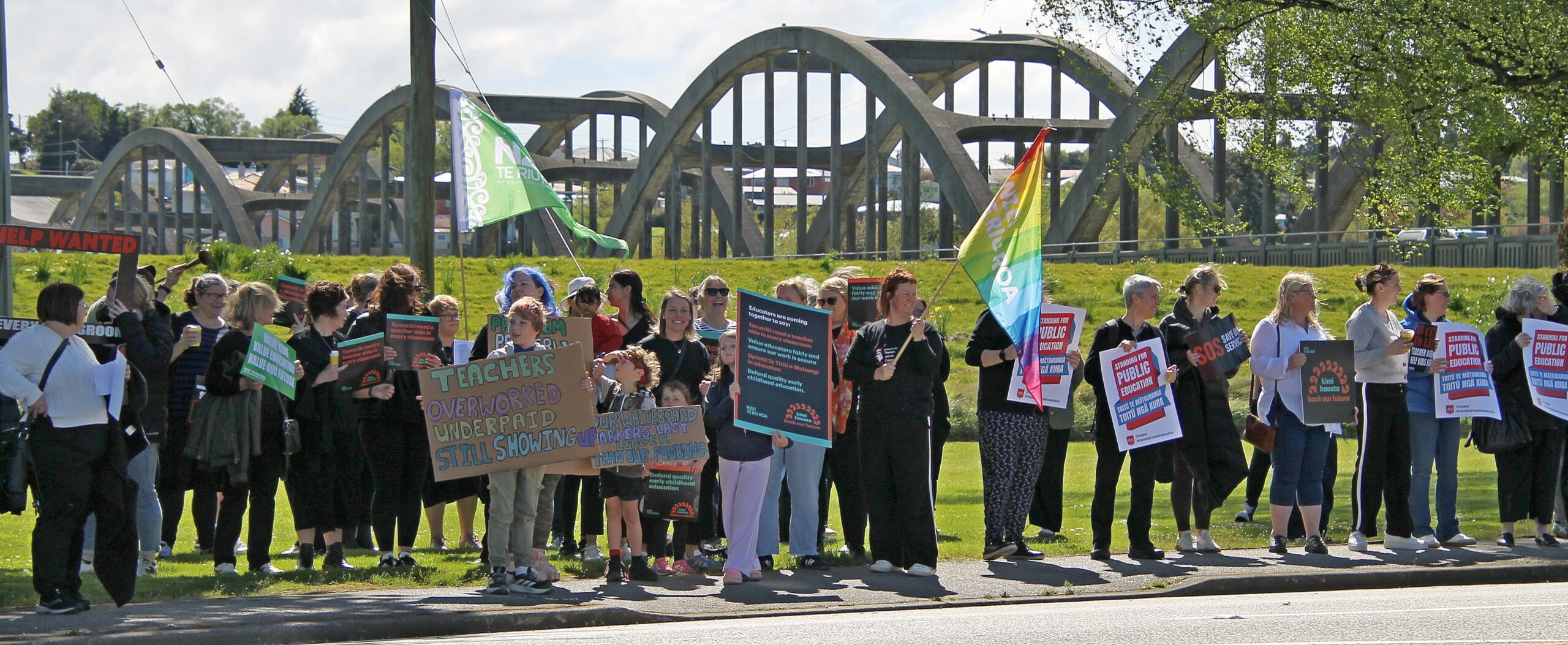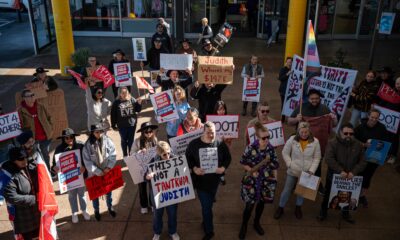Politics
Teachers Strike for Unity and Fair Conditions Across New Zealand

Teachers across New Zealand took part in a nationwide strike to advocate for improved working conditions, fair pay, and quality education for students. The action, organized by the NZEI Te Riu Roa teacher’s union, saw significant turnout in Balclutha, where union representatives emphasized the importance of unity among various labor groups.
Jen Jeffery, a representative from NZEI Te Riu Roa, brought protest materials, including a rainbow-striped flag, from Dunedin to show solidarity. She noted the diverse support at the Balclutha demonstration, stating, “We’ve got Etu union members supporting us and NZNO, ASMS and PSA and some firefighters joining us as well.” The central theme of the strike was kotahitanga, or unity, as participants urged the government to address their demands.
Jeffery pointed out the need for essential resources in classrooms, highlighting the importance of having teacher aides in every classroom and ensuring that the Treaty of Waitangi is honored. While she refrained from discussing the practical implications of this treaty in education, her sentiments resonated with many in attendance.
Toby Swallow, a teacher at South Otago High School and chairman of the Parent-Teacher Association, addressed the crowd, reflecting the frustrations felt by educators. He stated, “Teachers want the best for students but can no longer tolerate growing workloads and resource shortages.” Swallow expressed that while teachers would prefer to be in their classrooms, they could not allow the education system to remain under-resourced.
The strike aimed to highlight that the current collective agreement proposals for secondary teachers would not resolve the ongoing teacher supply crisis. “In fact, the last offer sought to increase teacher workloads at a time when teachers are already leaving the profession,” he noted.
Both Swallow and Jeffery acknowledged that public sector salaries are funded by taxpayers. However, they declined to speculate on how their demands might impact taxation or other public funding areas. Swallow emphasized the importance of pastoral care, stating, “It’s hard to teach children who aren’t attending, haven’t eaten properly or have specialized mental health needs.”
A spokeswoman for the Public Service Association estimated that over 18,000 members and supporters participated in the nationwide demonstration. She claimed that government priorities have resulted in pay offers that fail to address the current cost of living crisis, while “landlords and tobacco companies get big tax breaks.”
The strike reflects growing discontent among educators in New Zealand, as they seek to draw attention to the challenges within the education system and advocate for the necessary resources to support both teachers and students effectively. As the demonstrations continue, the impact of these collective actions remains to be seen in future negotiations with the government.
-

 Sports2 months ago
Sports2 months agoNetball New Zealand Stands Down Dame Noeline Taurua for Series
-

 Entertainment2 months ago
Entertainment2 months agoTributes Pour In for Lachlan Rofe, Reality Star, Dead at 47
-

 Entertainment3 weeks ago
Entertainment3 weeks agoNew ‘Maverick’ Chaser Joins Beat the Chasers Season Finale
-

 Sports2 months ago
Sports2 months agoSilver Ferns Legend Laura Langman Criticizes Team’s Attitude
-

 Politics4 weeks ago
Politics4 weeks agoNetball NZ Calls for Respect Amid Dame Taurua’s Standoff
-

 Entertainment2 months ago
Entertainment2 months agoKhloe Kardashian Embraces Innovative Stem Cell Therapy in Mexico
-

 World3 months ago
World3 months agoPolice Arrest Multiple Individuals During Funeral for Zain Taikato-Fox
-

 Sports2 months ago
Sports2 months agoGaël Monfils Set to Defend ASB Classic Title in January 2026
-

 Entertainment1 month ago
Entertainment1 month agoTyson Fury’s Daughter Venezuela Gets Engaged at Birthday Bash
-

 Sports1 month ago
Sports1 month agoHeather McMahan Steps Down as Ryder Cup Host After Controversy
-

 World1 week ago
World1 week agoSevere Winds Hit New Zealand, Over 100 Flights Canceled
-

 Entertainment1 month ago
Entertainment1 month agoTyson Fury’s Daughter Venezuela Gets Engaged at Birthday Bash





















